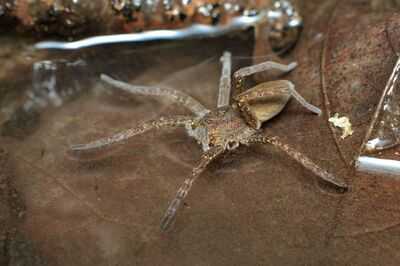Homeowners have been told to keep an eye for a new visitor that might be creeping into their homes this autumn.
A huge fish-eating spider, which was once thought to be extinct in Britain, is making a comeback in a huge win for conservation experts. And now the "fairly shy" hunters, which can grow to be as large as a human hand, have reportedly been spotted in UK homes.
The Fen Raft Spider is one of the largest spiders in the UK, with a leg span of up to 7cm. The species is easily recognisable with its chocolate-brown body and distinctive cream-white stripes along each side of its body, and - as their name suggests - these spiders can literally walk on water.
Fen Raft Spider were almost wiped out in the UK by 2010 due to habitat loss. But after years of conservation work by the RSPB to restore wetlands, their numbers are rising rapidly, with reports of them reappearing in parts of Norfolk.
READ MORE: Brits given Halloween warning that could lead to infestations
READ MORE: 'Hundreds of ladybirds are taking over my house and have started peeing on me'
Despite their appearance, they are not venomous and they pose no threat to humans. Their diet is mostly made up of other invertebrates such as small spiders, dragonfly larvae and pond skaters, Bournemoth Echo reports.
However, they have also been known to catch small vertebrates such as fish and tadpoles, according to the RSPB.
Fen Raft Spiders are semi-aquatic spiders, named for their ability to run across the surface of the water to catch their prey, 'floating' like a raft.
They will actively hunt instead of building webs to catch their next meal. Their long legs are covered in tiny hairs that detect the slightest of vibrations on the water's surface, which they can then run across to capture their prey.
Back in 2010, the future looked bleak for Fen Raft Spiders, with the remarkable arachnid on the brink of extinction. But a successful translocation collaboration between Suffolk Wildlife Trust and Sussex Wildlife Trust has helped to save these critically endangered spiders.
READ MORE: Couple's pet tarantula disappears for a year and then something unexpected happens
Working together, the RSPB, the Suffolk and Sussex Wildlife Trusts, Natural England, the Broads Authority, and the British Arachnological Society, together with funders and supporters, established new sustainable spider populations in the Norfolk Broads.
RSPB Mid Yare nature reserves site manager, Tim Strudwick, said: "The Fen Raft Spider is one of the UK's rarest invertebrates and we are proud of the role our reserves and teams have played in its recovery.
"These spiders have an important role in maintaining the rich aquatic diversity found in the grazing ditches on our reserves. The females are impressive in size, but also beautiful – they are truly special to see!"
You may also like

Five Naga tribes end boycott of govt events after Nagaland cabinet accepts key demands

Manipur: Assam Rifles commemorates 1962 Indo-China war heroes

Bihar polls: NDA united and moving ahead of Mahagathbandhan, says RLM chief Upendra Kushwaha

Grand celebrations at Mahakaleshwar Temple in Ujjain on Diwali and Roop Chaudas

J-K: Indian Army jawans posted in Kathua celebrate Diwali, lit up diyas







